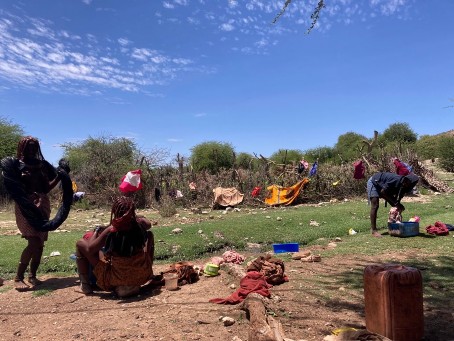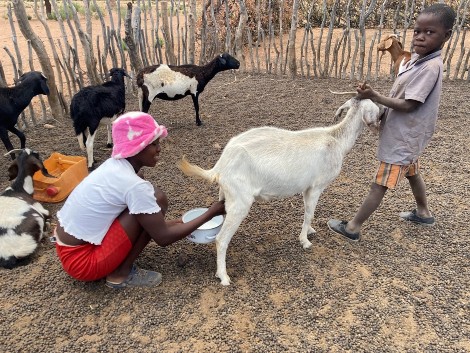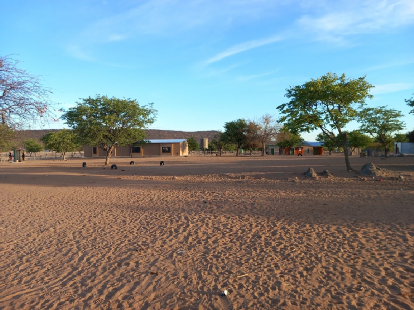Report on the Dispatch to Namibia: Acquiring knowledge: The study of children’s livelihood and indigenous knowledge in Ovahimba
Shino Yamamoto
3rd year student
Division of African Area Studies
Graduate School of Asian and African Area Studies
Kyoto University
Dispatch Period: 2nd November 2022−26th January 2023
Destination of Dispatch: The Republic of Namibia
Key Words: children, socialization, nomadic life, daily activities, learning knowledge
1. Research Project
As part of the Scientific Research (S) “Ecological future making of childrearing in contact zones
between hunter-gatherers and agro-pastoralists in Africa”, this study aims to clarify what knowledge
and skills children acquire in the Nomadic life of Himba society in the arid region of northern
Namibia through participant observation of childrenʼs lives.
2. Details of My Stay
The purpose of this research is to understand the situation in order to proceed smoothly with future research and surveys toward the achievement of the research agenda stated above. For this reason, I took permission to conduct the field survey and to determine the research site. In addition, I did interviews and participant observation with local people in order to clarify the direction of future research.
During the first half of the stay, I stayed in Windhoek, the capital city in the Republic of Namibia, and visited related institutions. I also visited some institutions, such as the National Libraries of Namibia and the National Archives of Namibia, to get permission to do research and to gather information. Also, I visited the places where the survey was to be carried out and gathered information to make a decision on my research. During the latter half of the stay, I stayed in two villages of Himba and conducted participant observation and interviews. Moreover, visiting the school and kindergarten and interacting with the children and other people provided a good basis for further research for my next stay.
3. Impressive Experiences
During my stay in the village, I spent most of my time with girls. I joined and did work with them on the tasks they carried out. The cooking, washing, fetching water, farm management, and nomadic activities performed in the household were often taken by children, and they played important roles in their pastoral practices and daily practices in their lives. The children played, talked, and interacted with their friends in nomadic activities and daily practices. I realized again that these opportunities provide not only an opportunity to learn the knowledge of nomadic life but also important opportunities for people to interact with each other.


4. Achievement and Reflection

The main purpose of my stay was to obtain permission to conduct the research and to find counterparts to promote the research together. In terms of getting permission, I received a research permit from the government agency by the end of this year, and permission to conduct future surveys from the village chiefs and heads of households. In the field research, I found host families in each region/village, which allowed me to establish a foundation for future research. In addition, I established good relationships with schools, kindergartens, and children. It became possible to study the daily life and learning of children, as well as to observe the life and learning process of children in educational institutions.
I stayed in villages during the school vacation season. Children staying at the hostel returned to their villages during the school holidays. Thus I was able to communicate with many of them in the villages. Most of them helped with housework and livestock management, I could spend a lot of time with them. However, most of the housework was carried out by the children. I couldn’t observe the children’s lives and roles after they left or after school started. Therefore, I realized that it is necessary not only to research how and what they learn from their daily practices but also to investigate how schooling is related to their lives and how it influences their lives. Also, I spent more time with the girls and I couldn’t observe the boys’ lives and activities very much.
5. Future Work
This stay in the village was so short that I couldn’t research or observe a large number of people. On the next visit, I plan to stay for a longer time and observe how they manage their school life and nomadic life. I also hope to research the boys’ lives, which I was not able to observe enough at this time.
